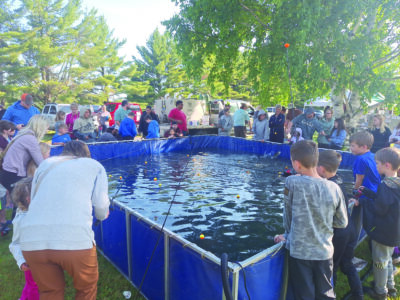Wasting Away: Biologist discusses nature of Chronic Wasting Disease

Katrice Perkins/Daily Mining Gazette Michigan Department of Natural Resources Wildlife Biologist Sara Thompson gives a short presentation on Chronic Wasting Disease at an engagement meeting on Thursday evening.
The Michigan Department of Natural Resources held its last public outreach meeting to gain feedback and suggestions on how to fight against Chronic Wasting Disease (CWD) Thursday evening at the Magnuson Hotel in Houghton.
Wildlife Biologist Sara Thompson gave a short presentation on the disease then opened the floor for suggestions, questions and concerns, which she and Wildlife Biologist Supervisor Craig Albright answered.
The fatal neurological disease attacks deer, elk, and moose, is highly contagious and can be spread by both direct and indirect contact.
The DNR has held 11 outreach meetings over the past month hoping to determine whether it should take an aggressive approach with CWD like Illinois or be passive and let nature take its course.
“Just making rules is not going to do anything if people don’t believe it is a serious problem. …This has to be a collective effort,” said Albright.
North East Kent County and South East Montcalm County have the highest known rates of CWD in Michigan.
Because the disease is hard to get rid of and there’s not much information on how it is transported, the DNR is hoping to contain the prevalence rates, which determine how serious of a problem it is.
“It’s really about the prevalence rate. The more animals out there shedding those prions in a given area, the more risk it has to the deer herd so that’s why one of our main goals is to keep that prevalence rate down wherever we have it.”
Along with deer to deer contact, the disease prions can be found in things the deer contacted like soil and plants, causing it to live forever.
“If this isn’t on the landscape, you don’t want it on the landscape because it doesn’t just end when the deer dies,” said Thompson. “It goes into the environment. It is in the soil, gets taken up by plants and recycles itself.”
Although suggestions were asked to be written prior to ending the meeting, some people suggested baiting of the deer was a problem.
Now that the engagement meetings are completed and all feedback submissions are recorded, the feedback will be given to the Natural Resource Commission (NRC) to decide on.
The NRC will host a work session in Traverse City on May 9 that will be open to the public but public comment will not be accepted until its meeting on May 10. The commission is expected to decide on the issue in July or August.





